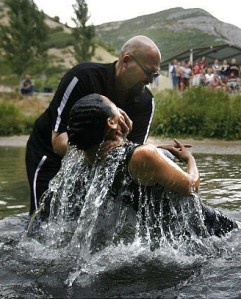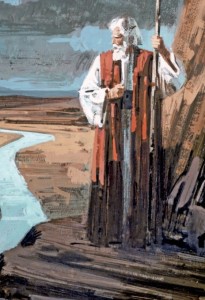This is the conclusion of a series begun in Part One as a search for a more meaningful answer to an aspiring young Christian’s question: “Why did God send His only son to die?” In part 2, we looked at what sin is, why it matters so much to God, and why it should matter to us. In part 3, we delved into God’s response to sin. In all of that discussion, we have made great mention of the fact that God has a plan for our salvation. In part 4, we looked at how Jesus really fits into that plan. In part 5, we examined what was expected of the Messiah, and why His death on the cross was necessary.
What Did the Cross Accomplish?
The Very Real Suffering of “The Suffering Servant”

The Mount of Olives, looking from Jerusalem, with Gethsemane on the left and the Basilica of the Agony (also called the Church of All Nations) at the right. It is the third in a succession of churches that have been built on the site where it is believed that Jesus prayed to the Father in the hours before his crucifixion.
It is all too easy for us to get into a mindset, knowing that Jesus was the Son of God, of (at least somewhere in the back of our minds) thinking that all of this was easy for Him. Or if not exactly easy, at least not as bad as it would be for a “regular”person. We must never forget that although Jesus was (is) the Lord, he had made himself a man. He had human emotions. He felt compassion for the hungry (Matthew 15:32), love for the sick and the suffering (Matthew 14:14). He cried real human tears for Lazarus’ death before he raised him from the dead (John 11:32-35). Even more telling as He knew what was coming, His agony, dread, and pleas as He prayed to the Father in the Garden of Gethsemane before His arrest clearly show his humanity (Matthew 26:36-46, Luke 22:39-46). There was nothing “easy” about preparing Himself to be crucified, any more than it was “easy” to be beaten and slowly killed on that cross. So what exactly did His loving sacrifice and
resurrection accomplish?
Release From the “Curse of the Law”
The culmination of God’s plan to redeem mankind came at such a high price to Him, but it accomplished so much for us. This supreme sacrifice by Jesus redeemed us from what Paul calls “the curse of the law” in Galatians 3:10-13. Quoting Deuteronomy 27:26 (“Cursed be everyone who does not abide by all things written in the Book of the Law, and do them”), Paul points out that none of us could ever be justified under that criteria because we all have sin in our lives. And so the sacrifices and offerings made under the old law simply put off God’s judgment.

Gethsemane, Rock of Agony, where tradition says Jesus prayed
By the blood of His sacrifice, God put Jesus forward as a propitiation (an appeasement or satisfaction) for our sins (Romans 3:25, 1 John 2:2, 1 John 4:10). Hebrews 9, speaking of the way things were before Christ, goes into some detail about the earthly “Most Holy Place” of the Tabernacle (into which only the High Priest could enter with blood to offer). The word used for the “mercy seat” In Hebrews 9:5 (which was the lid on top of the ark) is the same as is used for “propitiation,” which is to say that it was a covering – a concealment – for the judgment of the law contained therein.
This earthly Holy Place and the Holy things it contained, the Hebrew writer refers to as mere “copies of the heavenly things” which are in Heaven. By His death and resurrection, Jesus became a new High Priest of a better covenant (Hebrews 4:14-16, Hebrews 7:22). And Hebrews 9:11-12 explained that by His own blood, He entered once and for all into THE Holy Place, securing an eternal redemption for us. Thus, Paul says in Romans 7:6, “…now we are released from the law, having died to that which held us captive, so that we serve in the new way of the Spirit and not in the old way of the written code.”
Eternal Life
Paul reminds us in Romans 5:12 that when man first sinned in Genesis 3, death also entered the world (“Therefore, just as sin came into the world through one man, and death through sin, and so death spread to all men because all sinned…”). Paul told Timothy in 2 Timothy 1:10 that Jesus “abolished death and brought life and immortality to light through the gospel.”
By His resurrection, Jesus was victorious over death; and He brought to us the promise that when He returns, all those who have “fallen asleep” will also be raised, and will come to meet with Him (as well as those who are still alive) (1 Thessalonians 4:14-17). And then, 1 Corinthians 15:22-26 tells us, “The last enemy to be destroyed is death.” The Hebrew writer said in Hebrews 2:14-15:
“…he himself likewise partook of the same things, that through death he might destroy the one who has the power of death, that is, the devil, and deliver all those who through fear of death were subject to lifelong slavery.”
How Does One Earn Salvation – This Eternal Life?
The answer, of course, is that one does not earn salvation. The bad news is that everyone has sinned, and however “small” one may consider his sins to be, God counts no difference between those sins and those we may consider to be the most despicable or callous. The good news is that Jesus already paid the price for our sins with His death. It is our faith in Jesus that justifies us through His grace, as told by Paul in Romans 5:1-2:
“Therefore, since we have been justified by faith, we have peace with God through our Lord Jesus Christ. Through him we have also obtained access by faith into this grace in which we stand, and we rejoice in hope of the glory of God.”
 But the fact that this salvation is freely given to us, does not mean we have no responsibility in the matter. We must obey His commandments, among which is as Acts 2:38 says: “Repent and be baptized every one of you in the name of Jesus Christ for the forgiveness of your sins…” Jesus said in Mark 16:16 “Whoever believes and is baptized will be saved, but whoever does not believe will be condemned.” Peter said in 1 Peter 3:21: “Baptism, which corresponds to this, now saves you, not as a removal of dirt from the body but as an appeal to God for a good conscience, through the resurrection of Jesus Christ.”
But the fact that this salvation is freely given to us, does not mean we have no responsibility in the matter. We must obey His commandments, among which is as Acts 2:38 says: “Repent and be baptized every one of you in the name of Jesus Christ for the forgiveness of your sins…” Jesus said in Mark 16:16 “Whoever believes and is baptized will be saved, but whoever does not believe will be condemned.” Peter said in 1 Peter 3:21: “Baptism, which corresponds to this, now saves you, not as a removal of dirt from the body but as an appeal to God for a good conscience, through the resurrection of Jesus Christ.”
Paul gives the best explanation in Romans 6:3-5: “Do you not know that all of us who have been baptized into Christ Jesus were baptized into his death? We were buried therefore with him by baptism into death, in order that, just as Christ was raised from the dead by the glory of the Father, we too might walk in newness of life.”
Staying the Course
If baptism were the end-all of the Christian’s commitment, how easy that would be. But how easy is it to remain righteous in a world that seems to become more and more wicked? Well, to be sure, Christians today (especially young people) face new and different challenges in that regard. But there really is nothing new under the sun (Ecclesiastes 1:9). We know that is true from reading the Scriptures about the time before the flood (Genesis 6:5-8), about Sodom and Gomorrah (Genesis 18:16-19:29), about God’s patience with the depraved wickedness of the Canaanites (Genesis 15:15-21) – and events all throughout history. But as Peter tells us as God’s children, Christians “are a chosen race, a royal priesthood, a holy nation, a people for his own possession, that you may proclaim the excellencies of him who called you out of darkness into his marvelous light” (1 Peter 2:9).
Paul proclaimed the great promise in Romans 2:6-8: “…to those who by patience in well-doing seek for glory and honor and immortality, he will give eternal life; but for those who are self-seeking and do not obey the truth, but obey unrighteousness, there will be wrath and fury.” The Apostle aptly described our course in Romans 12:2:
Do not be conformed to this world, but be transformed by the renewal of your mind, that by testing you may discern what is the will of God, what is good and acceptable and perfect.
/Bob’s boy
___________________
image © V. Gilbert & Arlisle F. Beers
Please note: I did not design the reading plan that I am following in my blog. All of my comments in this blog, however, are solely my responsibility. When reading ANY commentary, you should ALWAYS refer first to the scripture, which is God’s unchanging and unfailing word. Reading schedules, as well as a link to the site where you can get the reading plan that I’m currently following for yourself can be found on the “Bible Reading Schedules” page of my website at http://graceofourlord.com. For questions and help, please see the “FAQ” and “Summaries” pages there.
Share this (better yet, share the Bible selection with someone) :















